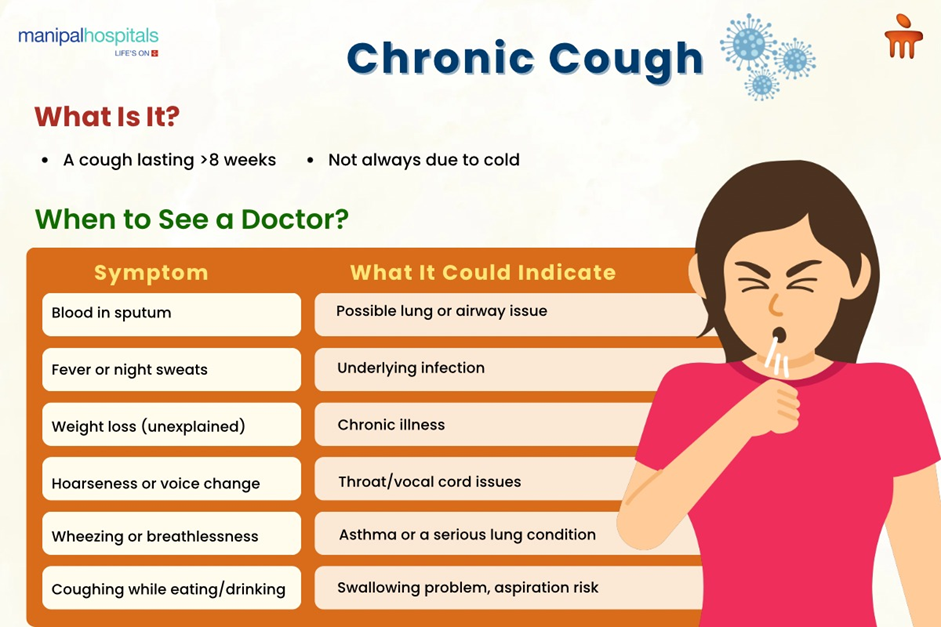
Have you been coughing for weeks, long after the cold symptoms have gone?
Usually, a chronic cough appears quietly and remains stubbornly persistent, disturbing sleep, your social life, and work. A lingering cough may seem harmless initially, but there is usually an underlying condition that needs medical attention. The very first step to treating a chronic cough is diagnosing what is causing it. The causes can range from postnasal drip to reflux to asthma. This blog covers everything you need to know about a chronic cough.
Synopsis
Common Chronic Cough Causes You Shouldn't Ignore
There are many possible causes of a chronic cough, ranging from nasal issues like postnasal drip to conditions affecting the lungs, such as asthma or chronic bronchitis. It’s not always what you might assume, which is why identifying the underlying cause is essential to finding the right treatment. If your cough persists for more than a few weeks, consult a pulmonologist for a thorough evaluation and appropriate care.
Below are the common chronic cough causes:
-
Postnasal Drip (Upper Airway Cough Syndrome): Excess mucus from the nose or sinuses drips into the throat, irritating the lining and triggering a cough. Often caused by allergies or sinus infections.
-
Gastro-oesophageal Reflux: Acid reflux doesn’t always cause heartburn. Sometimes, stomach acid irritates the throat and voice box, leading to chronic coughing, particularly at night or after meals.
-
Asthma or Airways Sensitivity: Mild difficulties in breathing can cause spasms in the throat and a persistent cough, which become severe when one engages in physical exertion or is subjected to cold air.
-
Some Medications: Drugs used to manage blood pressure, especially ACE inhibitors, can produce a dry, nagging cough in some people. A medication change may resolve the issue.
-
Infections or Bronchitis: Viral or bacterial infections that aren’t fully treated can cause inflammation in the airways, resulting in an ongoing cough long after the infection clears.
-
Foreign Particles or Irritants: Exposure to pollutants, tobacco smoke, dust, or mould can lead to airway inflammation and coughing. These irritants can be especially problematic in urban or humid environments.

When Your Cough Isn’t Just a Cough: Key Warning Signs
A persistent cough isn’t always just inconvenient; sometimes, continued coughing even after several weeks might be an indication of something serious. These are the key indicators to watch for.
|
Key Indicators |
What It Could Mean |
|
Blood in Sputum |
Seeing blood when you cough is never normal and requires immediate medical evaluation. |
|
Fever or Night Sweats |
These can signal an underlying infection or a more serious illness. |
|
Unexplained Weight Loss |
Losing weight unexpectedly alongside a cough may point to a deeper health issue. |
|
Persistent Hoarseness or Voice Change |
A lingering cough that affects your voice may indicate problems in the throat or vocal cords. |
|
Difficulty breathing or a tight chest suggests it’s time to seek urgent care. |
|
|
Coughing with Food or Liquid Intake |
Coughing while eating or drinking could point to swallowing difficulties or aspiration issues. |
Chronic Cough Treatment: What Works Today
Treating a chronic cough depends on the underlying cause. Here's a list of solutions that might bring relief.
-
Nasal Spray or Allergy Control: If postnasal drip is the culprit, nasal sprays, antihistamines, and saline rinses help clear congestion and soothe throat irritation.
-
Acid Blockers for Reflux: Lifestyle changes such as avoiding spicy foods, elevating the head while sleeping, and using acid-blocking medications can reduce throat irritation.
-
Inhalers or Breathing Support for Asthma: Medicines like inhalers help open up your airways and reduce swelling inside your lungs, making it easier to breathe and helping stop the cough.
-
Swapping Medications: If a cough persists, check in with a doctor to see if it’s drug-related – you may just need a switch.
-
Infections: For infections, antibiotics, antivirals, or supportive care may be needed, depending on the pathogen and severity.
-
Avoiding Irritants: Minimise exposure to irritants like smoke, mould, and chemical fumes. Air purifiers and masks may help in polluted environments.
-
Hydration & Gentle Lozenges: Warm drinks and throat pastilles can soothe tickles and cut coughing fits.
Conclusion
A chronic cough isn’t always just a nuisance; it can be a sign of something more serious. Identifying the root cause, whether it’s allergies, acid reflux, or another underlying issue, is crucial for effective treatment. With the right combination of medical care and lifestyle adjustments, most people experience significant relief.
If your cough persists without a clear reason, consult the pulmonology department at Manipal Hospital Jayanagar for a thorough evaluation.
FAQ's
A cough lasting more than eight weeks is typically labelled “chronic”. That means it’s stuck around longer than a standard cold or flu, and it’s time to evaluate what might be causing it.
Yes, acid reflux from Gastroesophageal Reflux Disease (GERD) can irritate your throat and lungs, triggering a persistent, dry cough, especially after meals or at night. Addressing the reflux often brings relief.
If your cough lasts more than 8 weeks or if you notice red flags like blood, weight loss, or fever, it’s time to seek help. Early evaluation can help identify issues such as asthma, reflux, or infection.
They may help with mild symptoms, but they don’t treat the root cause of a chronic cough. If your throat remains tickled, it’s best to find out what’s beneath that cough.
Absolutely. Dust, mould, pet dander, and pollen can stir inflammation in your airways, causing a lingering cough. Removing these irritants and managing allergies can ease cough symptoms very quickly.





















 5 Min Read
5 Min Read



















